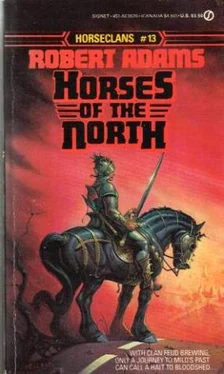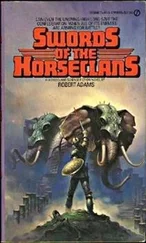Then, before any of them could react in any way, the next shot had taken Milo—now, by way of combat attrition, a second lieutenant—under the right arm he had just raised to dash the sweat from above his eyes. The 7. 9mm bullet tore completely through his chest at a slight upward inclination, tearing into the right lung, through it, then through the heart before exiting the left-frontal side of the chest and boring through the left bicep as well. Even as he dove to the hard, packed surface of the roadway, Milo had known that he was dead meat.
The lancing agony had been exquisite, unbearable, and Milo had screamed, taken a deep breath to scream once again and ended coughing hot blood, almost strangling on the thick liquid. With only the most cursory of examinations of him, Chamberlin, one of the two remaining original NCOs, had taken over, gotten the men off the exposed stretch of roadway without any more losses, taken one half of the unit, turned the other over to Corporal Gardner and, after they had shed or dropped every nonessential item of equipment, started them out toward the point at which he had seen the muzzle flash of the second shot.
As for Milo, he had just lain still, hoping that by so doing he could hold at bay the pain until he had lost enough blood to pass into a coma and so die in peace. But he did not, could not find and sink into the warm, soft, all-enveloping darkness, and the pain went on, unabated, movement or no movement. In automatic response to his body’s needs, he continued to breathe, but shallowly, having no desire to bring on another bout of choking on and coughing up more of his own blood.
Then, as he lay there, composed for the onset of his sure and certain death, the pain began to lessen. Although weak, he felt no drowsiness, no more than he had felt for the long days since the landings, at any rate. He opened his eyes and gingerly turned his head so that he could see—and see very clearly in the bright, summer-sunlit day, which last surprised him—the two contingents of his platoon swinging out wide to converge upon the suspected position of the sniper’s nest among the jumbled wall stones and free standing chimney of a burned-out farmhouse.
Feeling the pressing need for a clearer view of the distant objective, he cautiously moved enough to drag from under him his cased binoculars. Through the optics he saw three half-crouching figures, clad in Wehrmacht feldgrau, setting up a light machine gun, an MG42 by the look of it and fitted with the Doppeltrommel drum magazine, and the thing was on a rare tripod, which would make its fire far more accurate than from a more usual bipod, too.
With no base of fire to cover them and their advance, Milo knew that those men of his would be slaughtered. They did not even know about that machine gun—after all, they thought themselves to be stalking only a sniper and his assistant and could not see from their positions just what Jerry was setting up for them—wouldn’t realize the danger until the fantastically high rate of MG42 fire was ripping the life out of them.
He dismissed his own Thompson submachine gun without thinking; it was a superlative, if very heavy, weapon at normal ranges, but it just could not accurately reach out the required distance, in this case. Forgetting his fatal wounds in his worry for the men in such deadly danger out there, he allowed his body to slide down the bank and then wormed his way up to where Pettus’ body lay.
It took no little effort to shift the big man’s body enough to get both the BAR and the six-pocket magazine belt off it, but Milo accomplished both. Then, now laden with his own weapons and equipment as well as the automatic rifle and its seven weighty magazines, he crawled up the bank to its brushy top and took up a position that gave him a splendid field of fire. A pair of mossy rocks situated close together provided both bracing for the bipod of the BAR and a certain amount of protection from any return fire, almost like the embrasure of a fortification.
He took time to once more scan his target area with the binoculars and estimated the range at eight hundred yards, plus or minus a dozen or so. With the bipod resting securely on the boulders at either side, he scooted backward and calibrated the sights for the supposed range, then set the buttplate firmly into the hollow of his shoulder, nestled his cheek against the stock and set his hand to the grip and his forefinger to the trigger.
Expertly feathering the trigger so as to loose off only three or four rounds per firing until he knew himself to be dead on target, Milo cruelly shocked the short squad of Wehrmacht who were preparing a deadly little surprise for the two small units of assaulting Americans. As short bursts of .30 caliber bullets struck the fire-blackened stones and ricocheted around the ruined house, the Gefreite reared up from where he lay and, using his missing Zugsführer’s fine binoculars, swept the area from which the fire seemed to be coming, nor did it take the veteran long to spot the flashes of the BAR.
The present danger superseding, in his experienced mind, the planned ambush, he pointed out the location of the weapon that now had them under fire to the MG-gunner and ordered return fire. When he had spotted the glint of sun on glass, Milo had anticipated counterbattery fire and had scooted his body behind the longer and larger of the boulders, pressing himself tightly into the hard, pebbly ground, so he had only to brush off stone shards and moss, then get back into firing position. He now had the range.
As Chamberlin later told the tale: “Well, whin I heared that damn tearing-linoleum sound, I knowed it was more than just some damn Jerry sniper up in that place, so I just stayed down and hoped old Gardner would have the good sense to do ’er, too. Then I realized it was a BAR firing from the road, too, and all I could figger was old Pettus, he hadn’ been kilt after all and was giving us all covering fire, keeping the damn Jerries down so’s we could get up into grenade range of ’em. So I waved my boys on, slung my M1 and got a pineapple out and ready.”
Milo was down to his seventh magazine when he saw, then belatedly heard the first grenade explosion within the enemy position, at which point he ceased firing, lest he accidentally make a casualty of one of his own men. Slinging the BAR, he slid down the bank to the roadway and was there to greet the two makeshift squads as they came back to their starting point.
When Chamberlin saw Milo, his eyes boggled and he almost dropped the pair of fine Zeiss binoculars he had stripped from off the incomplete body of the now-dead Gefreite.
“Gawd almighty damn!” Gardner exclaimed, letting the holstered broomstick Mauser that had been the MG-gunner’s sidearm dangle in the dust. “Sarge … uhh, Lootenunt, we thought you’s daid, fer shure. I know damn well that bullet hit you—I could see the fuckin’ dust fly up outen your fuckin’ field-shirt. So why the fuck ain’t you daid, huh?”
Milo had no real answer for Gardner’s question, not then, and not now, almost a century after the end of that war. Knowing that he must say something, however, he said that the bullet fired by the sniper had simply torn through his baggy shirt, leaving him unscathed—the first of many such lies he was to tell to explain the unexplainable, over the course of years—and he blamed the bloodstains on his necessary handling of Pettus’ body when he took the BAR and magazine belt from off it. The men believed him, none of them able to think of any other explanation, especially when no wounds could be found anywhere on his body.
Milo recalled that he had sustained at least two, maybe three, more dangerous wounds before the end of the war, more during the Korean thing, several more during his years in Vietnam and a couple after the U. S. Army retired him as overage, when he had gotten bored in retirement and became a mercenary. The wounds all had left scars, but these were faint, tiny, almost-invisible things, and he no longer could remember just where or when or how he had come by any particular one of them.
Читать дальше












